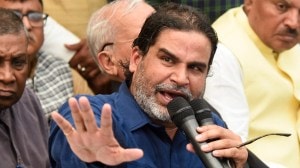TRAI disregard for Govt priorities under the lens
NEW DELHI, MAR 11: Angered by the recently announced increases in telephone tariffs by the Telecom Regulatory Authority of India (TRAI), ...

NEW DELHI, MAR 11: Angered by the recently announced increases in telephone tariffs by the Telecom Regulatory Authority of India (TRAI), which pinch the pockets of the poor and middle class sections of the society but are a bonanza for the richer and larger users, the government may consider amending the TRAI Act of 1997 to remove ambiguities. What has really upset the government is the complete disregard for the government’s priorities and concerns of Parliamentarians by the TRAI.
The government, embarrassed by the TRAI’s announcements in the Parliament, is likely to take a tough stand on the exact role of the Authority especially with regard to sensitive issues like pricing of telephone services.
The point that the government would like to clear now was that the TRAI’s role would be restrict itself to resolving disputes between private telecom companies without interfering with the government’s functions in the role of a policy maker. So far as pricing of telecom services is concerned, the TRAI and the government may have joint consultations on the issue but the government’s decision would be final.
Top sources in the government today expressed their displeasure with the TRAI saying “three or four people in the Authority cannot decide the fate of the entire country”. The dismal regard shown by the TRAI to suggestions made by the Standing Committee of the Parliament and the Consultative Committee apart from the Communications Minister Jagmohan himself, to tread cautiously so far as large changes in telecoms services were concerned, is the government’s bane of contention with the TRAI. “Despite this, they have turned the existing system upside down,” they say.
Authoritative sources in the communications ministry were concerned about the TRAI’s attitude towards warnings spelt out clearly by senior members of the Parliamentarians like Somnath Chatterjee and Nilotpal Basu who had interacted with the TRAI. “Yet each of these concerns were spurned without a thought for the obligations of the government to meet targets for the Ninth Plan recently approved, which needs the Department of Telecommunications (DoT) to take the number of telephone connections in the country to two crore which includes covering three lakh remote villages,” said DoT sources.
These sources dubbed the entire exercise by the TRAI as a sell-out to the “richer” sections of the society by giving sops to commercial establishments through drastic reduction in leased line charges, STD/ISD rates, cell phone rates. And all this has been done at the cost of the poor, through increased rentals in rural areas, and the middle class again through increased rentals and reduction in the duration of calls from five to three minutes which can send the monthly bills into a tizzy.
Sources declared that the TRAI’s calculations were questionable as they were not based on scientific data. Most of the data has been based on experiences of western countries which were in a different stage of development. “In India our problem is to bring the people on the fringe into the circle of telecom services, and at these rates, they may be forced to stay away now,” they explain.
On the question of the effect on foregoing investment if the TRAI’s role is curtailed, these sources say “what is the concern of the foreign investor in an issue which involves the people of this country and the government.” They say that even if private companies coming in now demand higher prices as investment is more expensive now than it was when the DoT was setting up its networks, the DoT has provided them with a readymade market for their services without their having to work very hard on it.



- 01
- 02
- 03
- 04
- 05




























